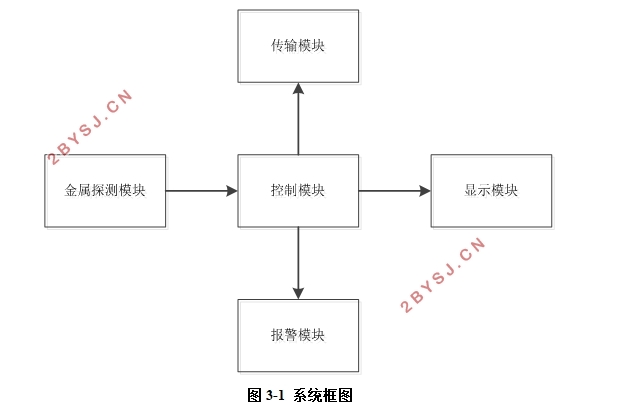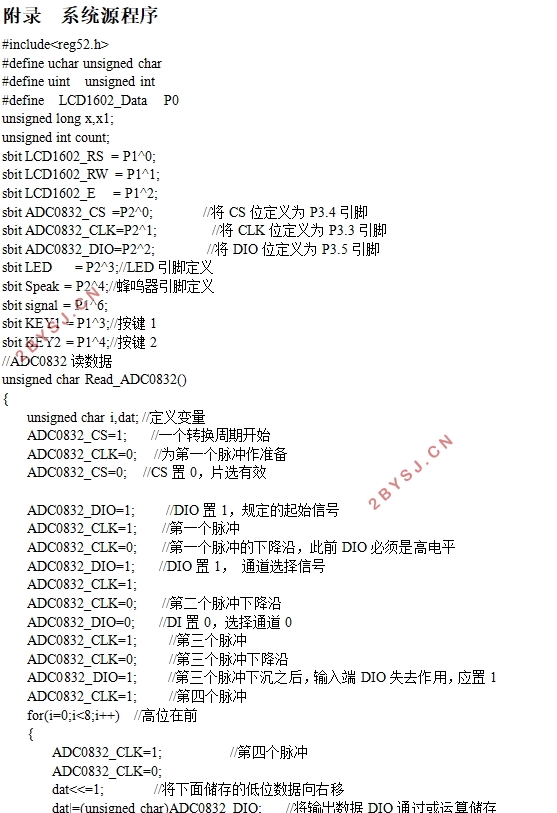金属探测器设计
无需注册登录,支付后按照提示操作即可获取该资料.
金属探测器设计(论文12600字)
摘要
本设计是基于单片机的金属探测器的设计,采用STC89C51单片机芯片,通过电容三点式振荡电路产生磁场,利用霍尔元件将磁场的变化转换为电压信号,再经由放大电路,A/D转换电路之后送给单片机处理,可以根据电压的大小判断是否检测到金属,利用LCD1602显示设定电压和实时电压,并可以通过按键调节设定的电压大小,在检测到金属后可以通过蜂鸣器和LED灯进行报警,并可以通过手机查询是否检测到金属。
关键词:单片机 霍尔元件 金属探测
Metal detector design
ABSTRACT
This design is a metal detector based on MCU.This design use STC89C51 microcontroller chip, through three point capacitance oscillation circuit generates a magnetic field, using Hall element will be the magnetic field variation is converted to voltage signal, and then through an amplifying circuit, A/ D conversion circuit after sent to the single chip machine processing, can according to the voltage to judge whether the detected metal, using the LCD1602 display setting voltage and voltage in real time, and can adjust the button. In the detection to the metal through the buzzer and LED lamp alarm, and can be detected through mobile phone inquiries metal.e.
Keywords:Microcontrollers;Holzer element;metal detection


目录
摘要 I
ABSTRACT II
第一章 绪论 1
1.1 引言..................................................................................................................1
1.2 本论文主要任务..............................................................................................3
1.3 论文结构安排..................................................................................................3
第二章 相关技术简介 4
2.1 电磁感应原理 4
2.2 霍尔元件 5
2.3 蓝牙 6
第三章 金属探测器的系统设计 8
3.1 系统总体方案设计 8
3.2 方案选择 9
3.2.1 控制模块 9
3.2.2 显示模块 9
3.3.3 金属探测模块 9
3.3.4 报警模块 10
3.3.5 传输模块 10
3.3.6 方案实现 10
第四章 硬件设计 11
4.1 金属检测模块 11
4.1.1 磁场产生电路设计: 11
4.1.2 霍尔元件的使用 12
4.1.3 电压采集电路设计 12
4.1.4 A/D转换模块设计 13
4.2 控制模块 14
4.2.1 时钟电路 14
4.2.2复位电路 15
4.2.3单片机最小系统 15
4.2.4按键控制 16
4.3 显示模块 16
4.4 报警模块 17
4.4.1 蜂鸣器报警电路 17
4.4.2 灯光报警电路 18
4.5 传输模块 18
4.6 相关芯片介绍 19
4.6.1 单片机STC89C51 19
4.6.2 蓝牙模块HC-05 20
第五章 软件设计 22
5.1 主程序设计 22
5.2 数据处理程序设计 23
5.3 电压显示程序设计 23
5.4 按键消抖程序设计 23
5.5 蓝牙程序设计................................................................................................24
第六章 调试过程 25
6.1 硬件调试 25
6.1.1 单片机最小系统调试 25
6.1.2 液晶显示屏LCD1602调试 25
6.1.3 A/D芯片调试 25
6.1.4 蓝牙模块调试 26
6.2 软件调试.........................................................................................................27
第七章 论文总结 29
7.1 论文小结 29
7.2 下一步的工作 29
参考文献 ....................................................................................................................30
